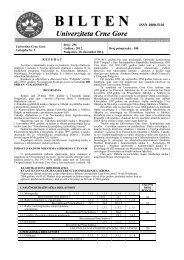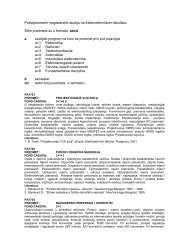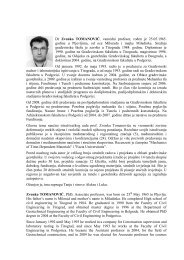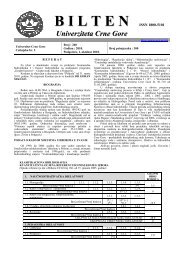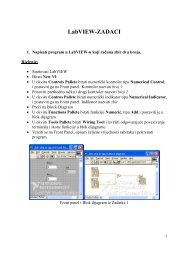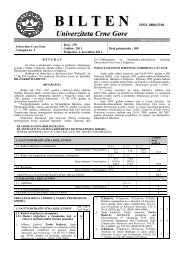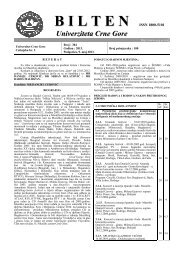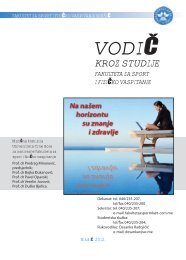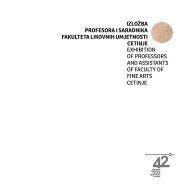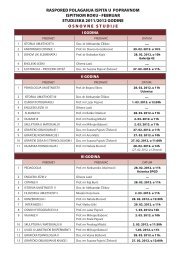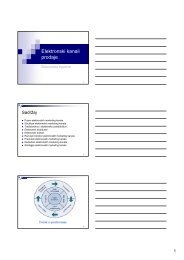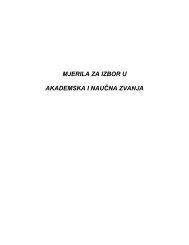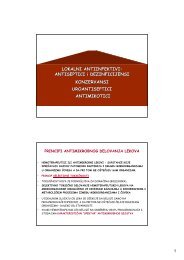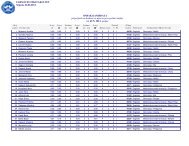WHO monographs on selected medicinal plants - travolekar.ru
WHO monographs on selected medicinal plants - travolekar.ru
WHO monographs on selected medicinal plants - travolekar.ru
You also want an ePaper? Increase the reach of your titles
YUMPU automatically turns print PDFs into web optimized ePapers that Google loves.
<str<strong>on</strong>g>WHO</str<strong>on</strong>g> <str<strong>on</strong>g>m<strong>on</strong>ographs</str<strong>on</strong>g> <strong>on</strong> <strong>selected</strong> <strong>medicinal</strong> <strong>plants</strong><br />
ti<strong>on</strong>. At the time of death (day 20), blood from portal and peripheral veins,<br />
and samples from intestinal mucosa, amni<strong>on</strong>, amniotic cells and placenta<br />
were collected, and the tissues were cultured in the presence of ricinoleic<br />
acid or indometacin. The c<strong>on</strong>centrati<strong>on</strong>s of prostaglandin E2 in the media<br />
or blood were measured by radioimmunoassay methods. The prostaglandin<br />
E2 levels in the portal vein increased; the prostaglandin E2 levels in<br />
peripheral blood showed no significant changes; the prostaglandin E2 levels<br />
in the tissues of the intestinal mucosa, placenta, amni<strong>on</strong> and amniotic<br />
cells were increased. Ricinoleic acid stimulated the synthesis of prostaglandin<br />
E2 in the tissues in vitro (27).<br />
Toxicology<br />
Toxicity studies <strong>on</strong> castor oil have been performed by incorporating the<br />
oil into feed rati<strong>on</strong>s at c<strong>on</strong>centrati<strong>on</strong>s as high as 10% of the diet. Animals,<br />
F344/N rats and B6C3F1 mice, of both sexes were fed the diet for<br />
13 weeks. Exposure to castor oil at dietary c<strong>on</strong>centrati<strong>on</strong>s as high as 10%<br />
in 13-week studies did not affect survival or body weight gains of rats or<br />
mice (10 per sex and dose). No biologically significant effects were noted<br />
in haematological analyses in rats. Small increases in total bile acids and in<br />
se<strong>ru</strong>m alkaline phosphatase were noted at various times during the studies<br />
in rats receiving the higher dietary c<strong>on</strong>centrati<strong>on</strong>s of castor oil. Liver<br />
weights were increased in male rats receiving the 10% dietary c<strong>on</strong>centrati<strong>on</strong><br />
and in male and female mice receiving diets c<strong>on</strong>taining 5% or 10%<br />
castor oil. However, no histopathological lesi<strong>on</strong>s were associated with<br />
these liver changes, nor were there any compound-related morphological<br />
changes in any organ in rats or mice. Thus, no significant adverse effects<br />
of castor oil administrati<strong>on</strong> were noted (28).<br />
Epithelial cells, isolated from small intestine of hamsters, were used to<br />
measure in vitro cytotoxicity of the c<strong>ru</strong>de d<strong>ru</strong>g. The cytotoxicity of ricinoleic<br />
acid (castor oil) was assessed by:<br />
— exclusi<strong>on</strong> of trypan blue;<br />
— release of intracellular (prelabelled) 51Cr; and<br />
— inhibiti<strong>on</strong> of cellular uptake of 3-O-methylglucose.<br />
Ricinoleate produced weak but dose-dependent (0.1–2.0 mM) cytotoxicity<br />
as assessed by all three methods (29).<br />
In an in vivo study, segments of rabbit ileum were examined by scanning<br />
electr<strong>on</strong> microscopy after exposure to various compounds known to<br />
stimulate fluid secreti<strong>on</strong> in the small intestine. After perfusi<strong>on</strong> with ricinoleate<br />
(castor oil) at a c<strong>on</strong>centrati<strong>on</strong> of 10 mM, striking changes were<br />
observed at villus tips and <strong>on</strong> the apicolateral surfaces of villi; erosi<strong>on</strong>s of<br />
the tips were c<strong>on</strong>firmed by light microscopy of the same pieces of tissue<br />
276



